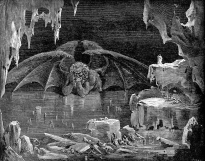Eve ate the apple and gave Adam the core – everyone knows that's what the story in Genesis 3 says.
Only it doesn't.
Genesis 3:1-7 tells of how the two fell into temptation when the serpent encouraged Eve to eat the fruit of the tree of the knowledge of good and evil – the only tree in the Garden of Eden which God had forbidden them.
But the exact fruit isn't specified, and it's very unlikely to be an apple.
For one thing, apples don't grow very well in the part of the Middle East where the story's set because it isn't cold enough.
Other candidates for the fruit include apricots, pomegranates and figs. These might be the best candidate, as we're told that Adam and Eve sewed fig leaves together to cover themselves when they realised they were naked, so the writer obviously pictures them being there.
But why, through so much of Christian history, have people believed that Adam and Eve ate apples? There are at least three reasons.

First, in English, until the 17th century the word 'apple' meant any kind of fruit except berries – including nuts. So if someone wanted to say that they ate a fruit, they would say 'apple' – a word that has a far more specific meaning for us.
Second, educated readers and translators would probably have made a link with the story of Hercules, whose 11th labour was to steal the golden apples that belonged to Zeus, the king of the gods.
Third, when it's read in Latin the story contains a convenient pun. In Latin, the words for 'apple' and 'evil' are similar. Malum is the word for 'apple'; it's also the word for 'an evil or a misfortune'. The coincidence is a gift for preachers.
Whatever the fruit envisaged by the writer, it's the symbolic meaning that's important. Of course no one could know the difference between good and evil just by eating a particular fruit. The commandment is arbitrary, as CS Lewis indicates in his science fiction version of the story (Voyage to Venus). What matters is keeping God's commandments. The story in Genesis continues to remind us of the consequences of not doing so, in broken relationships and regrets.
Follow Mark Woods on Twitter: @RevMarkWoods

















